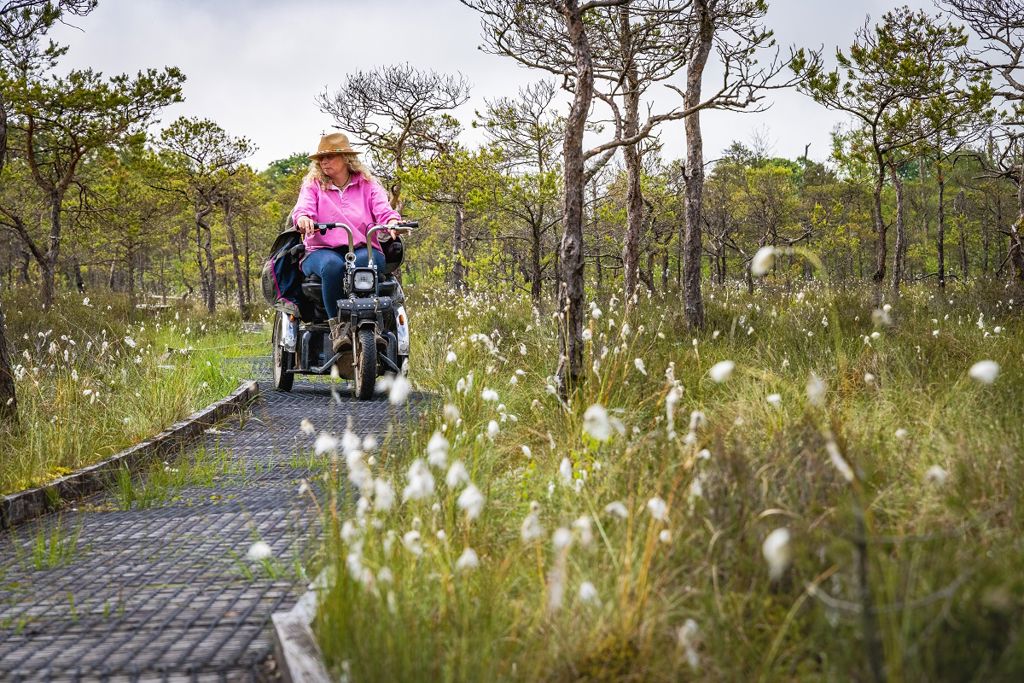The Arch, near Aberystwyth
Walks through huge beech trees with views over...

The embankment area close to the ponds is closed due to reservoir repairs. The Cors y Llyn Walk remains open.
The peaceful reserve of Cors y Llyn has one of the best wildflower meadows in Mid Wales and some of the trees here are only a few feet tall even though they are over 100 years old.
The meadow comes to life in spring and summer when a wealth of wildflowers, including orchids and Dyer’s greenweed, attract colourful butterflies.
The short accessible walking trail goes alongside the wildflower meadow and along a boardwalk past the stunted forest.
You can also explore the fields within the reserve.

The walking trail is waymarked from start to finish.
Look out for the information panel at the start of the trail.
Find out about walking trail grades.
Follow the path from the car park alongside the wildflower meadow to experience Cors y Llyn.
Seek out the Scandinavian-style dwarf pine forest and take in the swampy woodlands along the boardwalk.

Cors y Llyn is a National Nature Reserve.
National Nature Reserves are places with some of the very finest examples of wildlife habitats and geological features.
The landscape and wildlife varies depending on which time of year you visit – here’s what to look out for.

Cors y Llyn means “bog of the lake” and the bog and fenland was once a lake.
The two basins which form the core of the reserve were originally carved out by glaciers during the last Ice Age and filled with meltwater.
Over thousands of years, they gradually became choked with vegetation, stones and earth, to create the rich, mixed habitats at the reserve today.
The basins support a range of acid-loving plant-life, with abundant bog-mosses, ling, cranberry, cross-leaved heath and the insectivorous round-leaved sundew. At the edges, there are patches of bog asphodel.
The southern basin has its own distinctive character: the Scot’s pine here is severely stunted, Scandinavian style, because of the water-logged peat.
A ribbon of birch wood and fen surrounds the bog.
Over 100 flowering plant species have been recorded in the meadow, including heath-spotted orchid, carnation sedge, lesser skullcap and sneezewort.
Look out for pale-pink patches of colour in the meadow – these are the cuckoo flower which is one of the first flowers to bloom in very early spring.
A host of spring flowers follow this early display, including the heath spotted orchid, marsh violet and meadow thistle.
The meadow is at its best in summer with its wealth of wildflowers attracting lots of butterflies on warm, still days.
There is a colourful display of damselflies and dragonflies near the pond in summer, too, including some larger ones like the emperor and the southern hawker.
If you’re in luck, you might have the rare privilege of spying a hobby, catching these insects on the wing.
Look out for pied flycatchers, redstarts and wood warblers – the Welsh oak woodland summer visiting trio.
The brightly coloured mosses and lichens will help to brighten up even the dullest of days.
Listen out for the croak of the common frog as you walk past the damper areas.
You may also catch sight of a common toad and palmate newt.
Birds that visit the reserve during winter include woodcock and snipe.
There are over 70 National Nature Reserves in Wales.
Find out more about National Nature Reserves.
We want you to return home safely after your visit here.
You are responsible for your own safety as well as the safety of any children and animals with you during your visit.
Please note:
For advice and tips to help you plan your visit here go to Visiting our places safely.
There is a 250 metre path from the car park to the start of the boardwalk.
This path is mainly level and covered with mesh in places but has some uneven sections. The surface can be muddy after wet weather.
There are two gates before the path reaches the boardwalk.
The boardwalk is accessible.
There are benches along the boardwalk and passing places for wheelchair users.
See the top of this webpage for details of any planned closures or other changes to visitor facilities here.
For your safety, always follow instructions from staff and signs including those for trail diversions or closures.
We may divert or close trails whilst we undertake maintenance work or other operations and we may need to close other visitor facilities temporarily.
In extreme weather, we may close facilities at short notice due to the risk of injury to visitors and staff.
You may need permission from us to organise an event or to carry out some activities on our land.
Check if you are allowed to use our land.
We recommend you follow these directions or use the Google map below which has a pin on this place’s location.
Cors y Llyn is 3½ miles north west of Builth Wells.
Take the A470 from Builth Wells towards Rhayader.
After 3¼ miles, turn left onto the minor road, signposted Cwm-bach Llechrhyd.
Take the second left and follow this narrow lane alongside a privately-owned yard with farm buildings on the right.
The road continues past the yard and on to the small car park at the entrance to Cors y Llyn.
The Ordnance Survey (OS) grid reference for the car park is SO 016 556 (Explorer Map 200).
The postcode is LD2 3RU. Please note that this postcode covers a wide area and will not take you directly to the entrance.
View this place on the What3Words website.
The nearest mainline railway station is in Builth Wells.
For details of public transport go to the Traveline Cymru website.
Parking is free of charge.
Overnight parking is not permitted.
There are no staff at this location.
Contact our customer team for general enquiries during office hours, Monday to Friday.